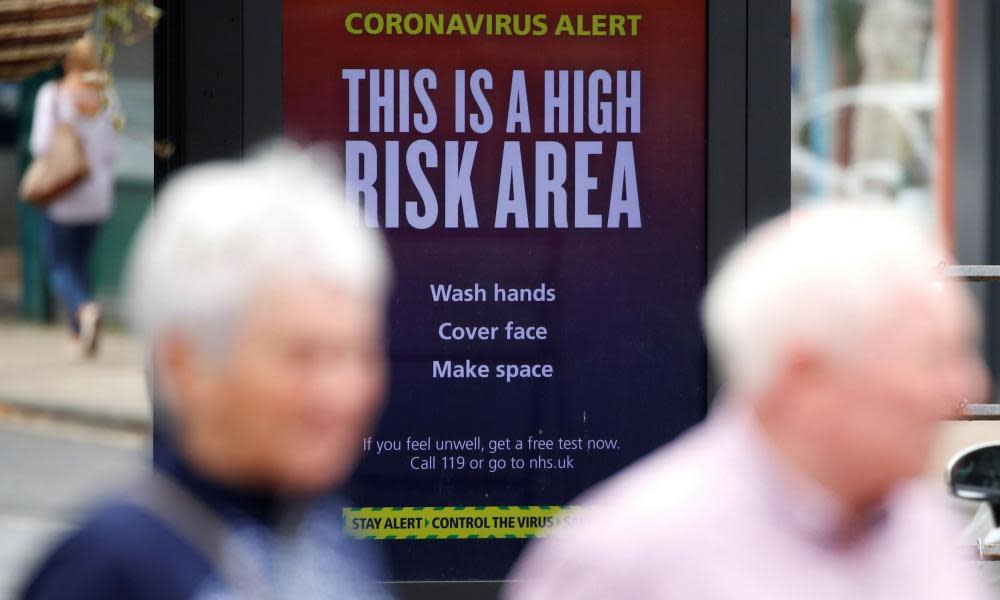Manchester Covid outbreak 'a warning to complacent white middle class'

The declaration of a major incident in Greater Manchester should jolt a “complacent white middle class” into realising that Covid-19 is not just spreading in ethnic minority households, one of the region’s health chiefs has said.
Eleanor Roaf, the director of public health in Trafford, said 80% of its infections in the last week were in the white community, and she urged the region’s 2.8 million residents to concentrate “much harder on what we can do to stop the wider spread”.
Greater Manchester police (GMP) and local authority leaders declared a major incident on Sunday amid concern about rising infection rates across the region. The move came at the start of a week when warmer weather is expected to draw greater numbers of people to parks, pubs and private gardens.
Nine of the region’s 10 local authorities are in the top 20 areas with the highest infection rates in England, according to NHS data for the week to Friday 31 July.
default
Legislation that came into force two weeks ago allows local authorities to close public parks, pubs and specific places of work if there is deemed to be a “serious and imminent threat to public health” from Covid-19.
In practice, the “major incident” could result in these closures happening more rapidly on the command of the region’s strategic coordination group, which is chaired by the GMP assistant chief constable, Nick Bailey, and includes figures from local authorities and the NHS.
Much of the coverage of the region’s rise in infections has focused on Oldham, where officials said last week that two-thirds of new cases were in the town’s Pakistani and Bangladeshi communities.
But in Trafford, one of the wealthiest and whitest of Greater Manchester’s 10 boroughs, the vast majority of infections in the last week were in the white community. Just 14.5% of Trafford residents are black or ethnic minority, according to the last census.
Eighty-one people tested positive in Trafford in the last week of July – the third biggest number in Greater Manchester, after Manchester (178) and Oldham (130).
“We are continuing to see more cases than we would like and what’s worrying is our positivity rate is going up. That is the number of people per hundred that test positive. What you want to try to do is keep that to about 1%. We are at 3% at the moment,” said Roaf. “Ninety-two per cent of cases had ethnicity recorded and of those 80% were white.”
She added: “The Trafford narrative is that it is a very white outbreak in Trafford. In other places the narrative is quite different. One of the anxieties is that we don’t end up with a complacent white middle class thinking it’s not affecting them because they think it’s about overcrowding in ethnic minority families.”
There has been concern that the new restrictions imposed on large parts of northern England last Friday would place a huge additional strain on police forces, who are anticipating an influx of calls from members of the public reporting suspected rule breaches.
One MP in north-west England said on Monday that police were very concerned about the pressure on resources as the weather improves this week, with additional patrols expected around public parks and reservoirs where large groups are known to gather.
The infection rate across Greater Manchester almost doubled from the beginning to the end of July – from 13 to 24 cases per 100,000 people. Data published by NHS Digital shows the number of infections in all but one of Greater Manchester’s boroughs increased in the week to Friday.
Oldham, which announced its own lockdown measures two days before the region-wide restrictions, has the highest infection rate in Greater Manchester with 55 cases per 100,000 people, the second highest in England behind Blackburn with Darwen.
Roaf said that two weeks ago many of the Trafford infections were in young people, aged 17 to 22, whereas the rise last week was among 26- to 64-year-olds. She said people did not need to be overly worried about the major incident but it should “focus people’s minds” on the fact the virus was still spreading.
Andy Burnham, the mayor of Greater Manchester, said the police rather than his office had taken the decision to declare a major incident. “It is taken for operational/technical reasons rather than ‘oh shit we’ve spotted something’,” he said. “I was quite happy for it to happen because we need to up our game really in terms of Greater Manchester-level coordination.”
He said the rise in infections was a logical conclusion to what he considered the premature relaxing of lockdown, particularly the reopening of pubs and restaurants. “I think people have been lulled into a false sense of security,” he said.
Burnham also called on the government to allow Greater Manchester to take over all contact tracing to control the virus. The service run by the local NHS trust managed to contact 98% of people, compared with between 50 and 55% nationally, he said.

 Yahoo News
Yahoo News 
